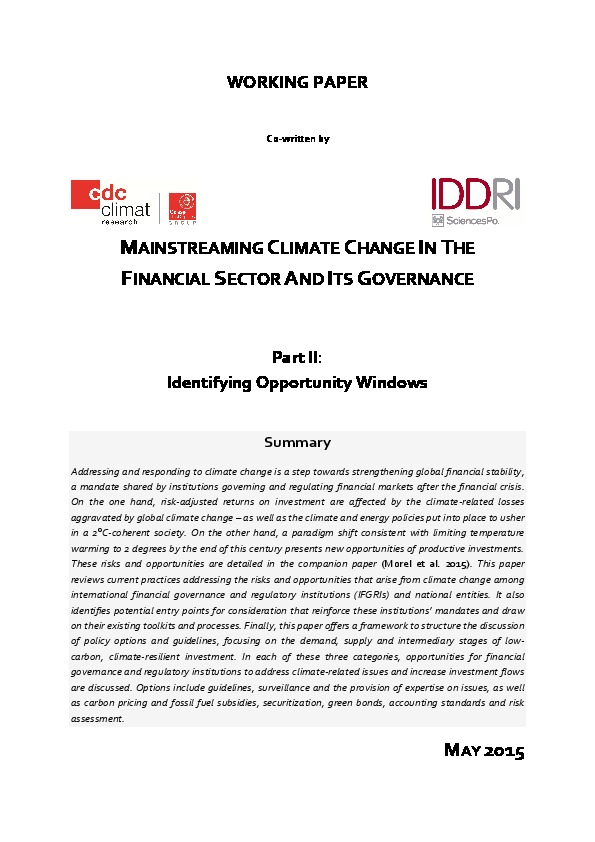Mainstreaming Climate Change in the Financial Sector and its Governance – Part II: Identifying Opportunity Windows
A joint working paper with the Institute for Sustainable Development and International Relations (IDDRI)
By Romain Morel (I4CE), Sani Zou (IDDRI), Ian Cochran (I4CE), Thomas Spencer (IDDRI)
This working paper is the second one of a series of studies on Mainstreaming Climate Change in the Financial Sector and its Governance.
Part II: Identifying Opportunity Windows
Addressing and responding to climate change is a step towards strengthening global financial stability, a mandate shared by institutions governing and regulating financial markets after the financial crisis. On the one hand, risk-adjusted returns on investment are affected by the climate-related losses aggravated by global climate change – as well as the climate and energy policies put into place to usher in a 2°C-coherent society. On the other hand, a paradigm shift consistent with limiting temperature warming to 2 degrees by the end of this century presents new opportunities of productive investments. These risks and opportunities are detailed in the companion paper (Morel et al. 2015). This paper reviews current practices addressing the risks and opportunities that arise from climate change among international financial governance and regulatory institutions (IFGRIs) and national entities. It also identifies potential entry points for consideration that reinforce these institutions’ mandates and draw on their existing toolkits and processes. Finally, this paper offers a framework to structure the discussion of policy options and guidelines, focusing on the demand, supply and intermediary stages of low-carbon, climate-resilient investment. In each of these three categories, opportunities for financial governance and regulatory institutions to address climate-related issues and increase investment flows are discussed. Options include guidelines, surveillance and the provision of expertise on issues, as well as carbon pricing and fossil fuel subsidies, securitization, green bonds, accounting standards and risk assessment.
The first paper of this series can be found here: Part I: A Necessary and Timely Evolution
A policy brief entitled “Mainstreaming Climate Change into financial governance: rationale and entry points” is published by the Centre for International Governance Innovation (CIGI). https://www.cigionline.org/
The authors welcome further comments and reviews by technical experts, which should be sent to the corresponding authors: romain.morel@i4ce.org; sani.zou@iddri.org; ian.cochran@i4ce.org; thomas.spencer@iddri.org
